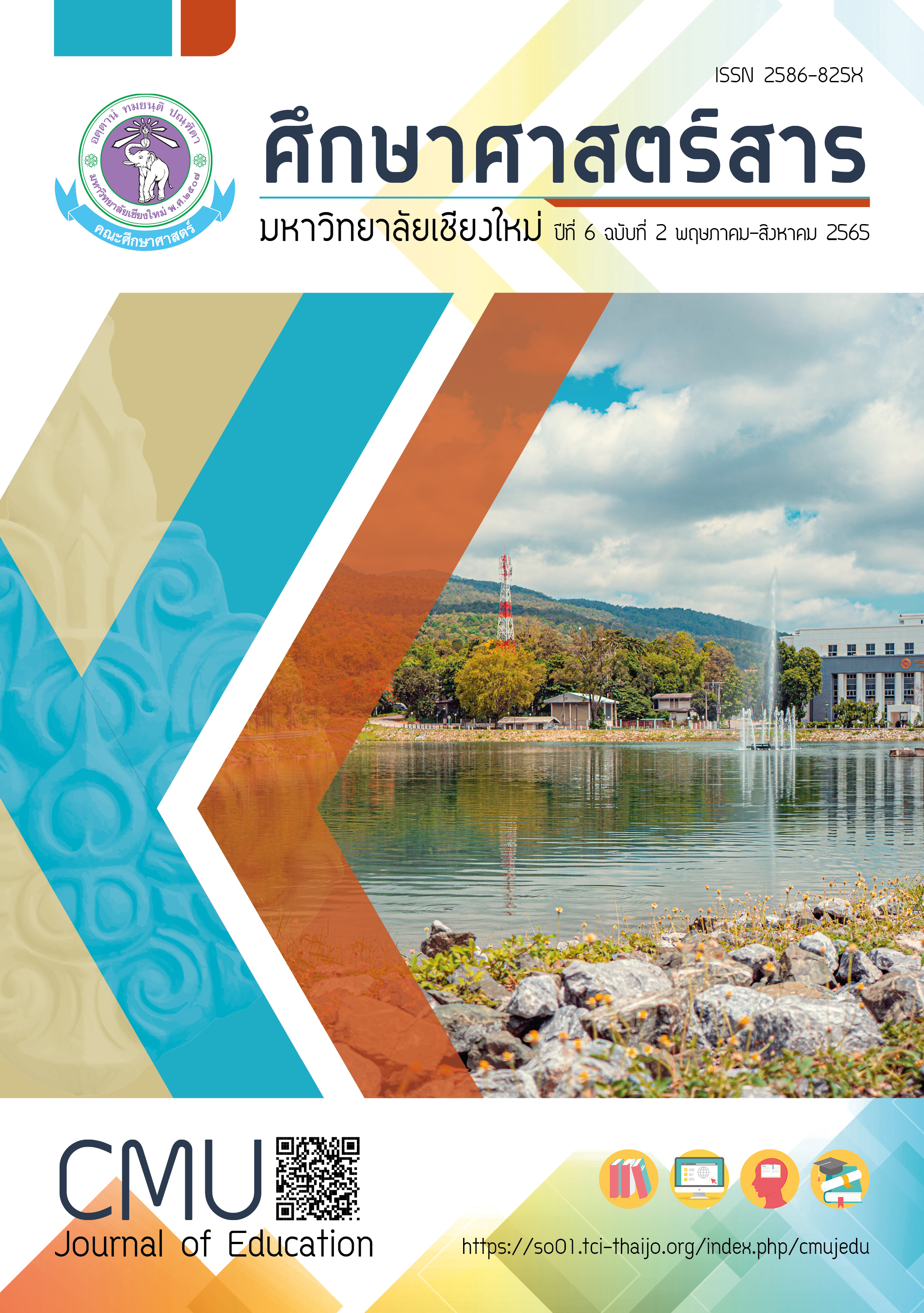เหตุผลและความสมเหตุสมผล: จากทฤษฎีการกระทำทางการสื่อสารของฮาเบอร์มาสสู่ทฤษฎีการเรียนรู้สู่การเปลี่ยนแปลงของเมอซิโรว์
Main Article Content
บทคัดย่อ
บทความวิจัยเรื่องนี้มีวัตถุประสงค์เพื่อสำรวจความเชื่อมโยงระหว่างแนวคิดเรื่องเหตุผลและความสมเหตุสมผลในแนวคิดการกระทำทางการสื่อสารของเยอร์เก้น ฮาเบอร์มาส และทฤษฎีการเรียนรู้สู่การเปลี่ยนแปลงของแจ็ค เมอซิโรว์ ทั้งในทางทฤษฎีและทางปฏิบัติการทางการศึกษา ในการศึกษาครั้งนี้ได้ใช้การวิจัยเอกสารและการวิเคราะห์เอกสารเพื่อตีความตัวบทจากเอกสารหลักและเอกสารที่เกี่ยวข้อง เครื่องมือที่ใช้ในการเก็บข้อมูล คือ แบบบันทึกเอกสาร แหล่งข้อมูลหลักที่ใช้ในการวิจัย ได้แก่ หนังสือ The Theory of Communicative Action: Volume one: Reason and the rationalization of society ฉบับที่ 1 ในปี ค.ศ. 1984 ของฮาเบอร์มาส และ บทความเรื่อง Concept and action in adult education ปี ค.ศ. 1985 ของเมอซิโรว์ ส่วนเอกสารรอง ได้แก่ หนังสือ และบทความวิชาการต่าง ๆ ที่เกี่ยวข้องกับการนำเสนอแนวคิดของเมอซิโรว์ที่วางอยู่บนฐานคิดของฮาเบอร์มาสในเรื่องเหตุผลและความสมเหตุสมผล จำนวน 14 เรื่อง การวิเคราะห์ข้อมูลในการวิจัยครั้งนี้ได้ใช้กรอบความคิดและกระบวนการเรื่องการวิเคราะห์ข้อมูลเชิงคุณภาพ โดยผลวิจัยพบว่า แนวคิดเรื่องเหตุผลและประเภทของการหยิบยกหรือการอ้างความสมเหตุสมผลของฮาเบอร์มาสเป็นพื้นฐานสำคัญของสาขาวิชาการศึกษาผู้ใหญ่ และปรากฏความเกี่ยวข้องทั้งในนิยาม เป้าหมาย พันธกิจ และปฏิบัติการทางการศึกษาของสาขาวิชาการศึกษาผู้ใหญ่และการจัดการเรียนรู้ผู้ใหญ่ด้วย ทั้งนี้ แนวคิดเรื่องการเรียนรู้แบบนำตนและเรื่องกระบวนการสนทนาด้วยความสมเหตุสมผลอย่างเป็นเอกฉันท์ได้เป็นรากฐานเชิงทฤษฎีในการสร้างกระบวนการเปลี่ยนแปลงทั้งในระดับปัจเจกบุคคลและในระดับกลุ่ม รวมถึงเป็นพื้นฐานในการตั้งเงื่อนไขและคุณลักษณะของผู้มีส่วนร่วมในการเรียนรู้แบบสนทนา ซึ่งในเวลาต่อมา เมอซิโรว์ได้พัฒนาเป็น “ทฤษฎีการเรียนรู้สู่การเปลี่ยนแปลง” นั่นเอง
Article Details

อนุญาตภายใต้เงื่อนไข Creative Commons Attribution-NonCommercial-NoDerivatives 4.0 International License.
หากผู้เสนอบทความมีความจำเป็นเร่งด่วนในการตีพิมพ์โปรดส่งลงตีพิมพ์ในวารสารฉบับอื่นแทน โดยกองบรรณาธิการจะไม่รับบทความหากผู้เสนอบทความไม่ปฏิบัติตามเงื่อนไขและขั้นตอนที่กำหนดอย่างเคร่งครัด ข้อมูลของเนื้อหาในบทความถือเป็นลิขสิทธิ์ของ Journal of Inclusive and Innovative Education คณะศึกษาศาสตร์ มหาวิทยาลัยเชียงใหม่
เอกสารอ้างอิง
ชนัดดา ภูหงษ์ทอง. (2560). การวิจัยปฏิบัติการเชิงวิพากษ์แบบมีส่วนร่วมเพื่อพัฒนาปฏิบัติการจัดการเรียนรู้ที่เน้นผู้เรียนเป็นสำคัญของนิสิตฝึกประสบการณ์วิชาชีพครูผ่านวิธีการเรียนรู้สู่การเปลี่ยนแปลง (วิทยานิพนธ์ปริญญาดุษฎีบัณฑิต). บัณฑิตวิทยาลัย มหาวิทยาลัยศรีนครินทรวิโรฒ.
ชนัดดา ภูหงษ์ทอง. (2561). การเรียนรู้สู่การเปลี่ยนแปลง: ความท้าทายของผู้สอนในระดับอุดมศึกษา. วารสารพฤติกรรมศาสตร์, 24(1), 163-182.
Bailey, K. (1994). Methods of social research. New York: The Free Press.
Brookfield, S. (2010). Learning democratic reason: The Adult education project of Jürgen Habermas. In M. Murphy, & T. Fleming (Eds.). Habermas, Critical theory and education (pp.125-136). New York: Routledge.
Calleja, C. (2014). Jack Mezirow’s conceptualization of adult transformative learning: A review. Journal of Adult and Continuing Education, 20(1), 117-136.
Fleming, T. (2012). Fromm and Habermas: Allies for adult education and democracy. Studies in Philosophy and Education, 31, 123-136.
Fleming, T. (2018). Critical theory and transformative learning: Rethinking the radical intent of Mezirow's theory. International Journal of Adult Vocational Education and Technology, 9(3), 1-13.
Fultner, B. (2011). Communicative action and formal pragmatics. In B. Fultner (Ed.), Jürgen Habermas: Key concepts (pp. 54-73). Durham: Acumen Publishing.
Gaspar, C. M. (1999). Habermas' theory of communicative action. Review: Habermas' theory of communicative action. Philippine Studies, 47(3), 407-425.
Habermas, J. (1963). Theory and practice. Translated by Viertel, J. (1988). Cambridge: Polity Press.
Habermas, J. (1968). Knowledge and human interests. Translated by Shapiro, J. J. (1978). Boston: Beacon Press.
Habermas, J. (1981a). The theory of communicative action: Volume one: Reason and the rationalization of society. Translated by McCarthy, T. (1984). Boston: Beacon Press.
Habermas, J. (1981b). The theory of communicative action: Volume two: Lifeworld and system: A critique of functionalist reason. Translated by McCarthy, T. (1987). Boston: Beacon Press.
Habermas, J. (1985). The Philosophical discourse of modernity. Translated by Lawrence, F. (1987). Cambridge: Polity Press.
Habermas, J. (1992). Between facts and norms: Contributions to a discourse theory of law and democracy. Translated by Rehg, W. (1996). Cambridge: Polity Press.
Habermas, J. (1983). Moral consciousness and communicative action. Translated by Lenhardt, C, & Nicholsen, W. S. (1999). Cambridge: MIT Press.
Habermas, J. (1988). Postmetaphysical thinking: Between metaphysics and the critique of reason. Translated by Hohengarten, M. (1992). Oxford: MIT Press.
Habermas, J. (1962). The structural transformation of the public sphere: An inquiry into a category of bourgeois society. Translated by Burger, T., & Lawrence, F. (1989). Cambridge: Polity Press.
Habermas, J. (2013). The lure of technocracy. Translated by Cronin, C. (2015). Cambridge: Polity Press.
Habermas, J. (2009). Philosophical introductions: Five approaches to communicative reason. Translated by Cronin, C. (2018). Cambridge: Polity Press.
Hillen, S. (2020). School staff-centered school development by communicative action: Working methods for creating collective responsibility - from the idea to action. Journal on Efficiency and Responsibility in Education and Science, 13(4), 189-203.
Hoggan, C., & Kloubert, T. (2020). Transformative learning in theory and practice. Adult Education Quarterly, 70(3), 295-307.
Koomen, M. (2019). The method of rational reconstruction for education in the tradition of Habermas. International Journal of Research & Method in Education, 43(5), 478-497.
Lafont, C. (2018). Communicative action. In H. Brunkhorst, R. Kreide, & C. Lafont (Eds.), The Habermas Handbook (pp. 499-503). New York: Beacon Press.
McCarthy, T. (1982). Rationality and relativism: Habermas’s ‘overcoming’ of hermeneutics. In J. B. Thompson, & D. Held (Eds.). Habermas critical debates (pp. 57-78). MA: MIT Press.
Mezirow, J. (1982). A critical theory of adult learning and education. Adult Education, 32, 3-24.
Mezirow, J. (1985). A critical theory of self-directed learning. New directions for continuing education, 25, 17-30.
Mezirow, J. (1985). Concept and action in adult education. Adult Education Quarterly, 35(3), 142-151.
Mezirow, J. (1996). Beyond Freire and Habermas: Confusion a response to Bruce Pietrykowski. Adult Education Quarterly, 46(4), 237-239.
Mezirow, J. (2000). Learning as transformation: Critical perspectives on a theory in progress. San Francisco: Jossey Bass.
Mogalakwe, M. (2006). The use of documentary research methods in social research. African Sociological Review, 10(1), 221-230.
Murphy, M. (2010). Forms of rationality and public sector reform: Habermas, education, and social policy. In M. Murphy, & T. Fleming (Eds.). Habermas, Critical theory and education (pp. 78-93). New York: Routledge.
Ongstad, S. (2010). The concept of lifeworld and education in post-modernity: A critical appraisal of Habermas’ theory of communicative action. In M. Murphy, & T. Fleming (Eds.). Habermas, Critical theory and education (pp. 47-62). New York: Routledge.
Poohongthong, C., & Supparerkchaisakul, N. (2017). Designing learner-centered instruction practices based on transformative learning through critical participatory action research. International Journal of Behavioral Science, 12(2), 31-49.
Regmi, K. D. (2017). Habermas, lifeworld and rationality: Towards a comprehensive model of lifelong learning. International Journal of Lifelong Education, 36(6), 679-695.
Scott, J. (1990). A matter of record, documentary sources in social research. Cambridge: Polity Press.
Strecker, D. (2018). The theory of society: Theory of communicative action (1981): A classic of social theory. In H. Brunkhorst, R. Kreide, & C. Lafont (Eds.). The Habermas Handbook. (pp. 360-382). New York: Beacon Press.
Taylor, E. W. (1997). Building on the theoretical debate: A critical review of the empirical studies of Mezirow's transformative learning theory. Adult Education Quarterly, 48(1), 34-60.
Taylor, E. W. (1998). The theory and practice of transformative learning: A critical review. Retrieved from http://files.eric.ed.gov/fulltext/ED423422.pdf.
Taylor, E. W. (2007). An update of transformative learning theory: A critical review of the empirical research (1999-2005). International Journal of Lifelong Education, 26(2), 173-191.
Tilak, S., & Glassman, M. (2020). Alternative lifeworlds on the Internet: Habermas and democratic distance education. Distance Education, 41(3), 326-344.


